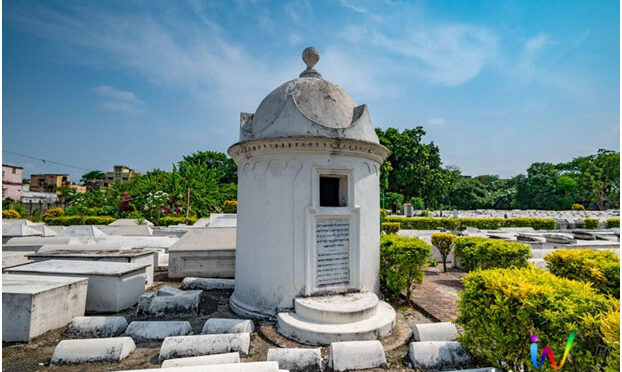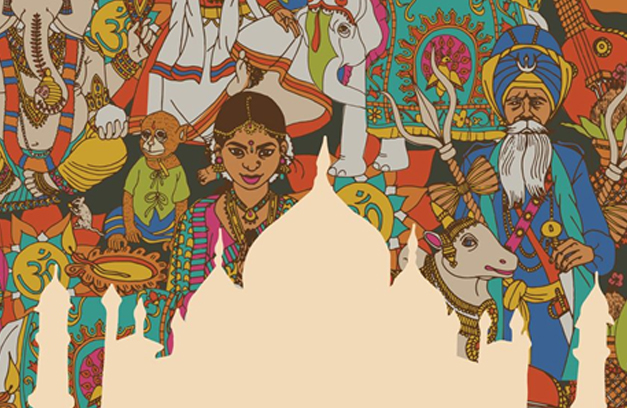EXPLORING THE CULTURAL INTRICACIES OF THE SYNAGOGUES OF KOLKATA
Posted on : January 9, 2024Author : Debanjana Chakraborty

Genzah(Genziot) at the Jewish Cemetery in Kollkata
The Jewish engagement with the Indian Sub-continent harks back to the heyday of the 1st Century BCE when the Bene Israel arrived due to a shipwreck off the coast of Western India. India harbours shelter to three distinct Jewish communities who derive their nomenclatures from their geographical residence or origin. This includes the Bene Israel or the Marathi Speaking Jews, mainly centred in Maharashtra, the Baghdadi Jews, mainly originating from Baghdad and the Cochin Jews remaining in the South. Kolkata, similarly, has been home to many Baghdadi Jews. These Baghdadi Jews arrived in the eighteenth Century in the hope of establishing themselves in the emerging British Empire. This community established what came to be called a Judeo-Arabic trading diaspora in the heartland of Kolkata. These grand merchant families, throughout the eighteenth and the nineteenth centuries, continuously straddled between what was a complete embracing of European culture and clutching on to their ancestral roots and traditions. However, by the turn of the twentieth century, there was a gradual shift from a Judeo-Arabic to a Judeo-British identity as there was a sharp decline in the dissemination of Judeo-Arabic newsletters and publications.

Following Indian Independence, the Baghdadi Jewish Community had to emigrate to other regions of Europe and the Middle East. This emigration did reduce the influence they had on the sub-continent, but there were many crucial remnants that they left behind. Although there are many a thousand Jews left in contemporary India, Jewish culture being represented through Synagogues remains evident. There are presently thirty-seven Synagogues in India with only some of them functional. Kolkata also houses many beautiful synagogues, some of which include:-
- Neveh Shalom Synagogue
- Magen David Synagogue
- Beth El Synagogue
These synagogues, apart from serving as a symbol of Jewish Cultural Heritage, serve as a greater reflection of Jewish-Muslim unity.
Neveh Shalom Synagogue

The Neveh Shalom Synagogue was the first synagogue to be built in Kolkata. The synagogue was built by Baghdadi Jews and was essentially built to sustain the demands of the rising Jewish population in the region. A Baghdadi Jew named Shalom Obaidah Ha built it in 1831 and named it after his late father, Shalom ha-Cohen. Initially, it was just a prayer hall, adorning the intersection of Brabourne Road and Canning Street, but later on this prayer hall gradually got replaced by the other two magnificent synagogues, Beth El and Maghen David.
Unfortunately, the complex was demolished in 1884, due to the provision of space for Magen David. However, in 1910, there began a restoration of the structure yet again. Keeping the similarities to the old complex, the Neveh Shalom Synagogue was rebuilt and refurbished. With the Indian Independence in 1947, this synagogue soon fell into utter neglect. Sadly, this Synagogue didn’t receive the heritage tag granted by the Archaeological Survey of India.

With its simple yet elegant interiors which consists of a central podium and a passage leading to the half-dome. This structure, although, lacks stained glass windows that depict the Ten Commandments.
If one is interested in visiting this place, a permission is required from Ms. A M Cohen, who is serving as the General Secretary, Jewish Community Affairs from the Jewish Girls School, Kolkata.
Magen David Synagogue

The Magen David Synagogue is located at the junction of Brabourne Road and Canning Street in Kolkata. This Synagogue was built by a Baghdadi Jew named Elias David Ezra in 1884 in the memory of his father, David Joseph Ezra. David Joseph Ezra was one of the most prominent Real Estate Agents of the time and many monuments, such as the Esplanade mansion, Ezra Mansion, is related to him. Ezra Street is named after him.
The synagogues is constructed in the style and resemblances of the Italian Renaissance. The Synagogue is approached through an arched door that has the ‘Star of David’ along with a Hebrew Inscription. Although the services of this synagogue have been stopped, it is fascinatingly and astonishingly well maintained. With the polished marble floor, the shining glittery chandeliers, beautifully illustrated glass-tainted windows depicting the Ten Commandments, this Synagogue is a source of great attraction to students and tourists alike.
Beth El Synagogue

The Beth El Synagogue is located near to the Magen David and Neveh Shalom Synagogues. It was built in 1856 and was financed by David Joseph Ezra and Ezekiel Judah. Unlike the Magen David, this synagogue carries impressions of British and apparently ‘un-Indian and sometimes Christian architecture’. It is a pale yellow structure bearing resemblances of Western inspired composition. The façade, which is furnished with Chunam (Lime) ‘is a classic tripartite design with recessed panels featuring rounded arched openings, pointed arched stained glass windows …..and the monumental central stairs leading up to a recessed porch that serves as the building’s foyer.’
The Synagogue, as argued by many scholars, also has classic elements of Baghdadi Jewish elements that include distinct wooden benches, hung lighting ceiling fans and elaborate framing of Hebrew Prayers.

Aspect of Harmony?
The Synagogues of Kolkata, as mentioned earlier, have a Judeo-Arabic past. Muslims and Jews were considerably more cordial to each other during the Medieval Age, quite harmonious if one makes a comparative analysis of the interactions with Judeo-Christian relations. However, the seven-decade long Israel-Palestine Conflict has significantly affected the nature of the Jewish-Muslim relationship. Yet, one finds beautiful interfaith connections blossoming among these synagogues in Kolkata.
All the three synagogues are currently taken care of by Muslim caretakers. For instance, the Beth El Synagogue has been maintained by a Muslim family for many generations. Its caretaker, Siraj Khan, commented last month in an article in the Times of India that:-
‘For us, managing the synagogue is more than a mere job, these are abodes of God. We pray for an end to the strife and the resumption of normal activities at these magnificent halls, where people of all faiths used to be welcome’
When enquired about the ongoing conflict between Israel and Palestine, another Muslim caretaker named Rabbul khan had remarked that:-
‘The wars are taking place in other countries. If the Jews had any issue with our religion, they wouldn’t have hired us. Religion has its own place while we have ours. This is something that we never think of. The Jews respect us and we respect them.’
Kolkata is indeed a multi-cultural and multi-linguistic region where the problems of politics do not always play out in a significant manner. There have been instances of clashes and fights but if one considers the larger socio-cultural picture of the region, it displays religious tolerance and diversity. That is why, some scholars argue that Jewish families often hire Muslim cooks because of their consumption being restricted to ‘halal’ meat and it is no surprise that the Jewish Girls’ School actually has a majority of Muslim students!
Concluding Remarks
The Jewish Community is Kolkata had a majority of Baghdadi Jews who had migrated to the region back in the eighteenth century. These Jews soon rose to prominence as they flourished financially in profitable businesses. In Congruence with their economic growth occurred a cultural flourishing which is evident through the establishment of many brilliant architecture dotting the city. These structures termed as synagogues remain a remnant of their efflorescence. Currently, there are many synagogues in Kolkata, mostly non-functional due to the absence of a Jewish population. These include the Neveh Shalom Synagogue, the Magen David Synagogue and the Beth El Synagogue. These three are minutes away from each other. Although roughly built across the same century, these three synagogues remain quite distinct from each other architecturally and aesthetically. For instance, Magen David holds a structure of the design of an Italian Renaissance blueprint, while the same doesn’t hold true for Beth El.
Yet, the only aspect of commonality, apart from their shared Judeo-Baghdadi Heritage, that these three synagogues have is the fact that they are maintained for generations by Muslims. This cultural intricacy is perhaps what makes the Synagogues of Kolkata truly fascinating and breathtaking.
References
- History of the Jews in Kolkata
Link: https://en.wikipedia.org/wiki/History_of_the_Jews_in_Kolkata
Last Accessed: 23/12/2023
- Neveh Shalom Synagogue, The Birth of the Oldest Synagogue in Kolkata
Link: https://rangandatta.wordpress.com/2014/10/09/naveh-shalome-synagogue-kolkata-calcutta/
Last Accessed: 23/12/2023
- Magen David Synagogue, Kolkata
Link: https://en.wikipedia.org/wiki/Magen_David_Synagogue_(Kolkata)
Last Accessed: 23/12/2023
- Synagogues: Witness to the History, Heritage and Harmony of Kolkata
Last Accessed: 23/12/2023
- Beth El Synagogue, Kolkata (Archive)
Link:http://archive.diarna.org/site/detail/public/3035/
Last Accessed: 23/12/2023
- Interfaith Connections have deep roots in Synagogues
Last Accessed: 23/12/2023
- Muslim Families look after Kolkata Synagogues
Link: https://www.aljazeera.com/features/2014/10/13/muslim-families-look-after-kolkata-synagogues
Last Accessed: 23/12/2023
Debanjana Chakraborty
Intern, Asia in Global Affairs
The originality of the content and the opinions expressed within the content are solely the author’s and do not reflect the opinions and beliefs of the website.





Leave a Reply